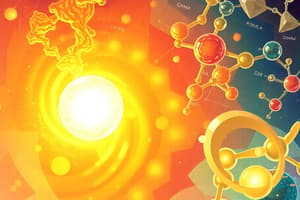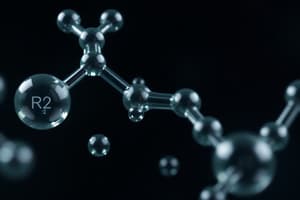Podcast
Questions and Answers
What is the mass, in grams, of 1.67 mol of Xenon (Xe)?
What is the mass, in grams, of 1.67 mol of Xenon (Xe)?
219.254
Calculate the amount (mol) of Rubidium (Rb) in 2.21 g.
Calculate the amount (mol) of Rubidium (Rb) in 2.21 g.
0.026
A sample contains 7.68×10^24 atoms of Chlorine (Cl). Calculate the amount of Cl in mol.
A sample contains 7.68×10^24 atoms of Chlorine (Cl). Calculate the amount of Cl in mol.
What is the molecular weight of Ca3(PO4)2?
What is the molecular weight of Ca3(PO4)2?
What is the mass of a sample of ethanol, C2H6O, containing 0.397 mol?
What is the mass of a sample of ethanol, C2H6O, containing 0.397 mol?
How many moles of lead(II) chromate (PbCrO4) are in 57.1 g?
How many moles of lead(II) chromate (PbCrO4) are in 57.1 g?
The formula for converting mass (g) to moles using molecular weight is quantity (g) x 1 (mol)/ _______.
The formula for converting mass (g) to moles using molecular weight is quantity (g) x 1 (mol)/ _______.
To calculate the number of molecules in a given mass, use the molar mass to convert from mass in grams to ______.
To calculate the number of molecules in a given mass, use the molar mass to convert from mass in grams to ______.
How many molecules are there in a 4.70 g sample of HCl?
How many molecules are there in a 4.70 g sample of HCl?
What is Avogadro's number?
What is Avogadro's number?
Define a mole (mol).
Define a mole (mol).
One mole of any element has a mass in grams equal to its ______.
One mole of any element has a mass in grams equal to its ______.
How many grams are in 1 mol of carbon atoms?
How many grams are in 1 mol of carbon atoms?
What is molecular mass?
What is molecular mass?
Define the atomic weight of an element.
Define the atomic weight of an element.
Define the molecular weight of a substance.
Define the molecular weight of a substance.
Define formula weight.
Define formula weight.
How many grams of HCl are in 0.536 mol?
How many grams of HCl are in 0.536 mol?
How many moles of ethylene gas, C2H4, are in 15.0 g?
How many moles of ethylene gas, C2H4, are in 15.0 g?
What is a chemical equation?
What is a chemical equation?
Define reactants in a chemical reaction.
Define reactants in a chemical reaction.
Define products in a chemical reaction.
Define products in a chemical reaction.
What does a chemical formula or chemical equation represent?
What does a chemical formula or chemical equation represent?
Why are chemical equations always balanced?
Why are chemical equations always balanced?
Balance the chemical equation: CH4 + O2 --> CO2 + H2O.
Balance the chemical equation: CH4 + O2 --> CO2 + H2O.
What is a coefficient in a chemical equation?
What is a coefficient in a chemical equation?
An aqueous solution is indicated by ______.
An aqueous solution is indicated by ______.
A gas is indicated by ______.
A gas is indicated by ______.
A liquid is indicated by ______.
A liquid is indicated by ______.
A solid is indicated by ______.
A solid is indicated by ______.
What is a combination reaction?
What is a combination reaction?
What is a decomposition reaction?
What is a decomposition reaction?
What are combustion reactions?
What are combustion reactions?
What is stoichiometry?
What is stoichiometry?
Flashcards are hidden until you start studying
Study Notes
Moles and Mass Calculations
- Xenon (Xe) has a molar mass of 131.29 g/mol; 1.67 mol of Xe weighs approximately 219.25 g.
- Rubidium (Rb) has a molar mass of 85.47 g/mol; 2.21 g of Rb equals 0.026 mol.
- Chlorine (Cl) sample with 7.68×10²⁴ atoms can be converted to moles by dividing the number of atoms by Avogadro's number (6.022×10²³).
- Lead(II) chromate (PbCrO₄) has a molar mass of 323 g/mol, and 57.1 g corresponds to approximately 0.177 mol.
- Ethanol (C₂H₆O) has a molecular weight of 46.08 g/mol; a sample of 0.397 mol has a mass of 18.3 g.
Molecular Weight and Conversion
- Molecular weight of Ca₃(PO₄)₂ is calculated as 310.17 amu, factoring in contributions from calcium, phosphorus, and oxygen.
- To convert mass to moles, apply the formula: mass (g) x 1 mol/molar mass (g) = amount in mol.
- For molecule quantification: first convert grams to moles, then use Avogadro's number to find the total number of molecules.
Avogadro's Number and Moles
- Avogadro's number: 6.022 x 10²³ represents the number of atoms or molecules in one mole of a substance.
- One mole of any element has a mass in grams equal to its atomic weight; for example, 1 mol of carbon atoms equals 12.011 g.
Chemical Fundamentals
- Molecular mass is defined as the mass of one molecular compound in atomic mass units (amu).
- Atomic weight refers to the weighted average of an element's naturally occurring isotopes.
- Formula weight is the sum of the atomic weights in a formula unit, applicable to both molecular and ionic compounds.
Chemical Equations and Reactions
- A chemical equation describes reactants and products' identities and proportions in a reaction.
- Reactants are substances consumed during a chemical process, while products are formed post-reaction.
- Chemical formulas can represent a single molecule or numerous identical molecules.
Principles of Balancing Reactions
- Chemical equations must be balanced based on the law of mass conservation, ensuring equal numbers and kinds of atoms on both sides of the reaction.
- Example: Balancing CH₄ + O₂ produces CO₂ + H₂O can be represented as CH₄ + 2O₂ → CO₂ + 2H₂O.
Types of Reactions
- Different reaction types:
- Combination reactions: A + B → C
- Decomposition reactions: C → A + B
- Combustion reactions: Involving rapid reactions that produce flames, usually with oxygen.
Miscellaneous Definitions
- Aqueous solution: Denoted as (aq).
- Gas: Denoted as (g).
- Liquid: Denoted as (l).
- Solid: Denoted as (s).
- Stoichiometry relates to mole ratios among reactants and products in chemical reactions.
Studying That Suits You
Use AI to generate personalized quizzes and flashcards to suit your learning preferences.




